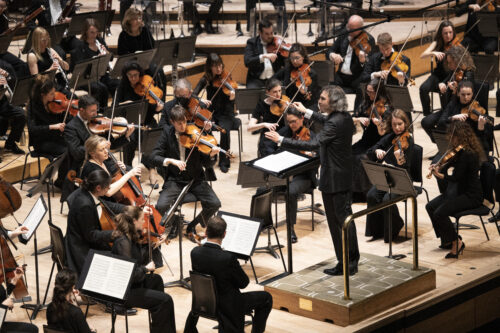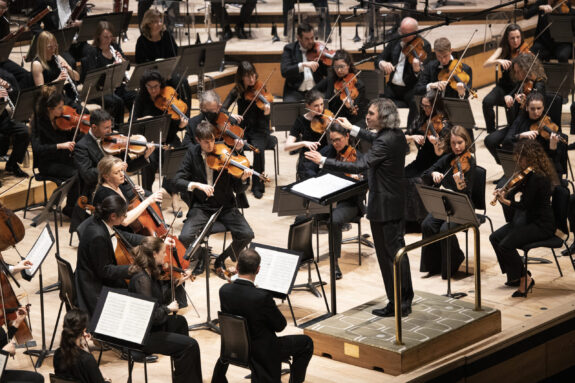 United Kingdom On the Transmigration of Souls – Haydn, Kurtág, Adams: Anna Devin (soprano), Hanna Hipp (mezzo-soprano), Rupert Charlesworth (tenor), Trevor Eliot Bowes (bass), Tiffin Youth Choir, London Philharmonic Choir, Jonathan Green (sound designer), London Philharmonic Orchestra / Vladimir Jurowski (conductor). Royal Festival Hall, London, 18.1.2025. (CC)
United Kingdom On the Transmigration of Souls – Haydn, Kurtág, Adams: Anna Devin (soprano), Hanna Hipp (mezzo-soprano), Rupert Charlesworth (tenor), Trevor Eliot Bowes (bass), Tiffin Youth Choir, London Philharmonic Choir, Jonathan Green (sound designer), London Philharmonic Orchestra / Vladimir Jurowski (conductor). Royal Festival Hall, London, 18.1.2025. (CC)

Haydn – Missa in tempore belli (‘Paukenmesse’) (1796)
Kurtág – Petite musique solennelle (2015)
Adams – On the Transmigration of Souls (2002)
Part of the ‘Moments Remembered’ series, this concert brought a welcome return from Vladimir Jurowski, bringing with hm his trademark programming, juxtaposing works from vastly different eras (and pens) related though external events:
Haydn’s Mass in C, Hob.XXII:9 reflects the general political instability in Europe at the time, and fear of invasion of Austria was palpable. As with the ‘Nelson’ Mass, the soprano part seems to have particular importance (although the demands are not as great here). The soloist here, Anna Devin, was of preternatural clarity, with a lovely glint to her voice but no sense of added edge. Hanna Hipp was a strong mezzo (the two are foregrounded in the opening ‘Kyrie’). The male contributors were hardly less impressive, with tenor Rupert Charlesworth strong when called for (he arguably has the least to do) and Trevor Eliot Bowes was a firm bass with superb upper range (no change of tone, no sense of strain).
Jurowski stripped the orchestra down in size and used period instruments for the brass and timpani, ensuring their contribution to the Agnus Dei (where four trumpets came into play) had full weight. There was some beautiful playing elsewhere in the orchestra, too, including a most expressive cello solo in the ‘Qui tollis’ from LPO Principal, Kristina Blaumane, counterpointing the finely phrased singing of Bowes. The heart of the mass is the choir, though, and under its Artistic Director Neville Creed – who retires this summer after 30 years in the role – the London Philharmonic Choir excelled, right from the first strong consonant (the ‘K’ of ‘Kyrie’). The ‘Gloria’ emerged in a blaze of light. The choral transparency was splendid throughout, but particularly in this segment (where it really needs it).
Contrast was a real part of Jurowski’s strategy, something heard to fine effect in the ‘Credo’, between the complexity of ‘Credo in unum Deum’ and the darkly shaded ‘Et incarnatus est’ of the bass (with the soprano’s miraculous response at ‘Et Maria Virgine’) and the choir’s ‘secundum scripturas’ (itself a massive juxtaposition to ‘Et resurrexit’). Most importantly, counterpoint came through perfectly.
It was Hanna Hipp that came to the fore in the Sanctus, full-voiced before the almost operatic choral drama of ‘Pleni sunt coeli’ and Charlesworth’s resonant ‘Hosanna’. And how wonderfully the soloists worked as a quartet in the ‘Benedictus’, Devin spinning a line of silken legato against the staccato descents of her colleagues.
The ‘Agnus Dei’ was a religio-philosophical microcosm in itself, the interior choral opening statement opening out via Haydn’s harmonic workings, the trajectory of the dissonances leading to anguish and trumpet-drenched angst. The quartet’s ‘Dona nobis pacem’ struck deep.
Jurowski’s conducting is so exact and yet so expressive. Seeing it again is a reminder of just how textbook his technique is, and yet how communicative. Accents stung (the orchestra in ‘Benedictus’ prior to the timpani entrance); from the smallest detail to the overall vista of Haydn’s magnificence, all made perfect sense.
It is a long way from Haydn to Kurtág, the latter’s Petite musique solennelle was written in 2015 to celebrate Pierre Boulez’s 90th birthday. It does not sound too celebratory, though, more reflective and, with a tolling bell, ritualistic (perhaps a nod to Boulez’s own Rituel in memoriam Bruno Maderna). There were terrific trumpet solos from Paul Beniston (themselves linking perhaps to Adams’s Ives reference to follow?). The control overall was stunning, which does have a downside: split notes do rather stand out. Nevertheless, this was a performance of utter beauty.
The London Philharmonic Choir was joined by the Tiffin Youth Choir for John Adams’s remarkable On the Transmigration of Souls. A response to 9/11, the work focuses on memory as well as remembrance and is intended as a ‘memory space’. Adams was asked to write the piece a mere four months after the attack, and by his own admission the assignment was, to say the least, daunting.
The result, though, is one of Adams’s finest works. It required not just large forces but a pre-recorded electronic element that here filled the Royal Festival Hall: texts taken from missing persons’ posters and, in one case, the words of a flight attendant immediately pre-mortem.
The work is deeply felt and contains little that is unnecessary; for the vast majority of the time, Adams’s score is focused. It also includes a trumpet call (see above) that references Chales Ives’s The Unanswered Question (and we should not forget that Adams himself penned a work called My Father Knew Charles Ives).
Few conductors, I would suggest, could cave this piece out as convincingly as Jurowski. His sensitivity to Adams’s timbal shifts was reflected by the razor reflexes of the orchestra, which made the punctuating calling of names all the more effective in the narrative. A good idea, too, to place the solo trumpet in the Royal Box. The brass-saturated climax was all-encompassing.
A remarkable piece, delivered with preternatural force by Jurowski and his musicians: the choruses were as one voice, the young singers offering a different timbre that perhaps speaks of innocence in the face of hateful actions.
Beyond doubt, we need as much Jurowski in London as possible.
Colin Clarke

I couldn’t agree more, as one of the musicians fortunate enough to play in this concert, and to have worked with Jurowski for 15 years. He is sorely missed!